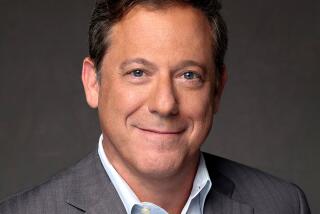Lions Gate stars in its own corporate drama
- Share via
Lions Gate Entertainment carved out a niche in Hollywood as a maverick that went up against the big studios. Now its own independence is at stake.
The Santa Monica motion picture and television company behind the acclaimed drama “Precious” and cable series “Mad Men” is battling a hostile takeover bid by one of Wall Street’s most feared speculators -- Carl Icahn.
An aggressive financial trader, Icahn is attempting to seize control of Lions Gate and possibly kick out its top managers, whom he accuses of following a flawed strategy and allowing the stock to languish.
It is not a position shared by Lions Gate Chief Executive Jon Feltheimer and Vice Chairman Michael Burns, who over the last decade have turned a little-known Canadian distributor of low-budget films into a nimble operator and the only publicly traded studio not owned by a media giant.
With the support of Lions Gate’s largest shareholder, Mark Rachesky, and one of the industry’s most savvy investors, Gordon Crawford, Feltheimer and Burns have by their own reckoning delivered on their promise to judiciously build a diversified studio with interests in film, television and digital platforms.
“The vision was very clear and we’ve accomplished most of the things we said we’d do during this 10-year time period,” said Feltheimer, who oversees day-to-day operations. He and Burns, a former investment banker who handles deal-making, have expanded the company’s theatrical operations through library acquisitions such as Artisan Entertainment, diversified into TV syndication and international distribution with the purchases of Debmar-Mercury and Lions Gate U.K., and are now focused on building a cable-channel business.
The studio is at a crucial juncture. At the same time that Lions Gate is spending millions to fight off Icahn, its executives are under pressure to prove that their recent investments in TV Guide Network and risky start-up pay-TV and online movie channel Epix will reverse the company’s negative cash flow and boost earnings and stock value.
“I believe this is a very well-run company and all Carl is doing is running up legal bills, distracting management and doing nothing productive for shareholders,” said Crawford, whose Capital Research Global Investors owns about 11% of Lions Gate. “I want them making films and TV shows and building their cable business, not spending their day with lawyers fending off a completely unrealistic bid.”
Icahn, who owns nearly 19%, is offering to buy all outstanding shares for $6 each, just below where Lions Gate’s stock is currently trading. Many analysts say Icahn’s offer is far too low to win over shareholders.
But, Icahn insists his price is fair -- a view shared by analysts at J.P. Morgan, the independent equity research arm of Lions Gate’s lead bank, JPMorgan Chase & Co.
“J.P. Morgan has said $6 a share looks like ‘a premium valuation,’ and I can’t say that I disagree with them,” Icahn said.
A Lions Gate shareholder since 2006, Icahn is frustrated that the stock has been in a rut, falling from a brief peak of $12 in 2007 to $4.85 in February. “Based on the performance of the stock, it’s clear that the shareholders have not been well served by top management,” he said.
If he were to gain control of Lions Gate, Icahn said, “the jury is still out on what we would do with Feltheimer and Burns.”
Though shares of other media companies such as Time Warner Inc. and Walt Disney Co. have rallied over the last year as the market rebounded, Lions Gate’s stock has not climbed much past $6.
“Of course we’d like to see our stock price higher,” Feltheimer said. “Bigger companies with scale have certainly bounced back with the economic recovery. We’re a growth company, and a number of things we invested in haven’t been reflected yet on the bottom line.”
Feltheimer and Burns say they believe both TV Guide and Epix, Lions Gate’s joint venture with Viacom Inc. and Metro-Goldwyn-Mayer Inc., will begin paying off with “significant contributions” over the next two to three years. They predict that by then TV Guide will contribute $75 million in cash flow and Epix not only will return its investment to date of $55 million but also will begin making money.
Feltheimer concurs with analysts who say that Lions Gate’s erratic theatrical performance has hurt the stock and that the studio needs to improve its batting average. Last weekend Lions Gate did just that when its latest Tyler Perry movie, “Why Did I Get Married Too?” debuted with a strong $29.3 million in domestic ticket sales.
And there is good buzz about the studio’s release next week of “Kick-Ass,” about a teen comic-book fanatic who becomes a real-life superhero.
In a world where scale matters, Lions Gate’s troubles underscore just how difficult it is to be a studio whose core business is making and distributing movies. “That’s why you need to be diversified, leverage your content into the channel business and figure out the smartest ways to play in the digital world,” Feltheimer said.
Lions Gate has for the most part avoided taking the risks on big-budget movies that have helped sink such highflying production outfits as Carolco Pictures. Still, Icahn, who rarely backs down from a fight he initiates, says Lions Gate has veered off plan and is investing too much in certain movies.
“I don’t think they should be taking significant capital risks in movie production or acquiring libraries,” said Icahn, who has lashed management for spending too much on the upcoming “Killers,” an action comedy starring Katherine Heigl and Ashton Kutcher, and for pursuing MGM before backing off when told its bid was too low.
Feltheimer and Burns reject Icahn’s criticism, saying their average cost per picture is $12 million to $13 million after international sales and tax credits. That includes “Killers,” which despite a budget of more than $70 million is costing Lions Gate about $40 million -- the most the studio has ever spent on a film.
Lions Gate executives acknowledge that they need to develop new franchises, as the studio’s Tyler Perry movies have been around for seven years and the slasher “Saw” series shows signs of wear.
Feltheimer said there would be “a big push in 2011 and 2012” to get new franchises going, including a “Twilight”-like female-appeal movie based on the popular novels “The Hunger Games.”
Lions Gate and Icahn are now in a race to win over shareholders, who will vote on a poison-pill plan in early May that the activist investor says he will challenge.
“Our plan is to ask our shareholders to ratify the shareholder-rights plan already in place and persuade our shareholders that staying the course as opposed to tendering to Carl is the right choice,” said Burns, noting that the chances of coming to some settlement with Icahn seemed “unlikely.”
That means the independence of both Lions Gate and its management remains uncertain.
“We’re in a fight with a very prominent, wealthy shareholder and obviously we all understand the risks for the company inherent in that,” Burns said.
More to Read
The biggest entertainment stories
Get our big stories about Hollywood, film, television, music, arts, culture and more right in your inbox as soon as they publish.
You may occasionally receive promotional content from the Los Angeles Times.










